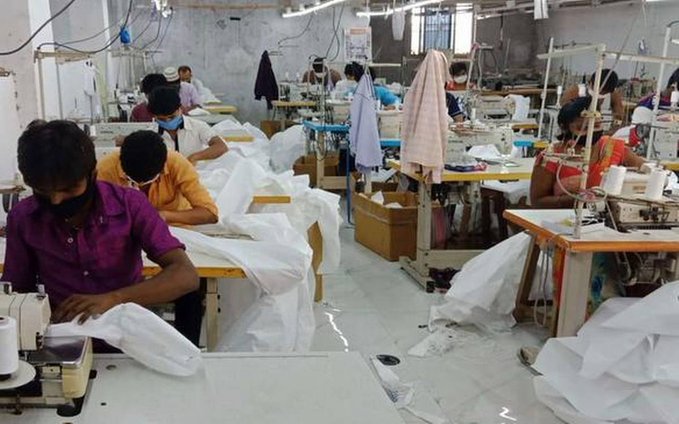#Bengaluru leads the way in #PPE coverall production; #Chennai & #Tirupur in Tamil Nadu, #Phagwara & #Ludhiana in Punjab, #Gurugram & #Noida in NCR have also become hubs for PPE coverall production
New Delhi: Production capacity of coveralls required by medical personnel treating COVID-19 cases in the country has been ramped up to more than 1 lakh per day. Bengaluru has become a major hub for PPE Coverall production in the country to combat COVID-19 cases. Nearly fifty percent of the Coverall production in the country is from Bengaluru. Since Body Coveralls (PPE) is a specialized protective suit meant for high level of protection to the health professionals, it has stringent technical requirements as prescribed by Ministry of Health & Family Welfare. M/s HLL Lifecare Limited is the designated single-window procurement agency for the hospitals and healthcare organisations under the Ministry of Health & Family Welfare, Government of India.
Other than Bengaluru, PPE Coveralls are also being manufactured by approved production units in Tirupur, Chennai and Coimbatore in Tamil Nadu, Ahmedabad and Vadodara in Gujarat, Phagwara and Ludhiana in Punjab, Kusumnagar and Bhiwandi in Maharashtra, Dungarpur in Rajasthan, Kolkata, Delhi, Noida, Gurugram and few other places. The cumulative production till date is approximately one million Coverall units.
During the last week of January 2020, the technical standard for the Coveralls was prescribed as per WHO class-3 exposure pressure in accordance with ISO 16003 or its equivalent. Such materials were being manufactured by a few international companies, who expressed their inability to supply on account of a complete glut in stocks and ban of exports by the source countries. Only a limited quantity was offered and procured by the procurement organization of the Ministry of Health & Family Welfare.
Ministry of Health & Family Welfare finalised the technical requirement on 2nd March 2020, based on the indigenous availability of materials and the technical requirement for a high level of protection of the healthcare professionals who would deal with the COVID-19 cases, in consultation with medical experts in the field. The specification was published on the official website of HLL Lifecare Ltd on 5th March 2020, inviting manufacturers having adequate capability to participate in the procurement process.
As of now, there are four laboratories in the country which have the Synthetic Blood Penetration Resistance Test facilities as well as necessary approvals for conducting tests and certification for Body Coveralls (PPE) required for COVID-19. These are – South India Textiles Research Association (SITRA), Coimbatore, Defence Research and Development Establishment (DRDE), Gwalior, and two laboratories under Ordnance Factory Board – Heavy Vehicles Factory, Avadi and Small Arms Factory, Kanpur.
For each such test conducted in respect of a fabric and the PPE Coverall garment, for which prototype samples are sent by the respective manufacturers, a Unique Certification Code (UCC-COVID19) is generated. This code has records of the type of fabric, type of garment, its date of testing, testing standard and other relevant particulars. The UCC issued to each passed sample is published on the official website of DRDO, OFB and SITRA for verification by any user of the product. With a view to further streamline the process of testing and to ensure that the quality of the PPE Coveralls is maintained, the testing laboratory will now accept the sample for testing only on submission of an affidavit in the prescribed format by the organization intending to get their PPE Coverall sample tested in the approved laboratories.
The PPE kits are being sent to the States by the Ministry of Health as per requirement. Ministry of Health & Family Welfare, Department of Pharmaceuticals, and Ministry of Textiles are continuously working with various industry bodies, stakeholders and manufacturers on 24×7 basis, to streamline the supply chain, remove bottlenecks and maintain a steady supply of all materials required for the healthcare professionals.

